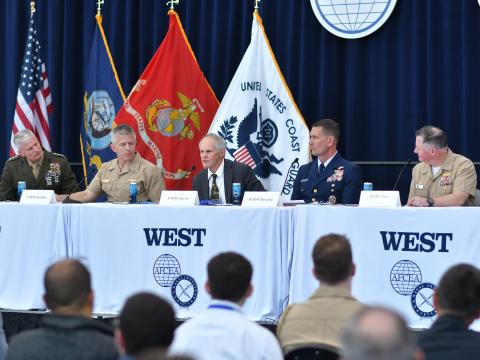Technology Is Not the End All Be All for Modern Warfighting
Emerging technologies are taking over the warfighting landscape. Military leaders, though in full support of leveraging those technologies for U.S. advantage, would like to put the focus back on the people.
“We need to look across the entire space and not believe that we can have just a technology solution remove this problem,” Rear Adm. Jeffrey S. Scheidt, USN, senior military advisor for cyber policy to the undersecretary of defense for policy, told the TechNet Cyber 2023 audience.
The admiral emphasized that the very near future of warfighting will be significantly more cyber-focused, and the department is simply not ready. “This is about how the people are going to react to the contested and congested cyberspace,” he continued, “I don’t mean to be pessimistic, but the fact is that we don’t know everything … so the premise that we can defend perfectly is really flawed.”
The cyber-heavy content of the battlespace will require more creativity, which will require a culture shift, according to Adm. Scheidt.
Christopher P. “Chris” Cleary, principal cyber advisor (PCA) for the Department of the Navy, highlighted a key fact: the military services are fairly new to the game of cyber. For example, the national defense strategy and national security strategy documents are still relatively new, and PCA positions are recent additions to the work field.
“We all need to get better at understanding how to learn to fight hurt, because the uniqueness in this space, if you traditionally look at warfighting through the lens of kinetic range ... now that we're moving into the nonkinetic space, we all live within the weapons engagement zone of our adversaries,” Cleary said. He asked industry to look back at the 1940s and act as the “ball bearing factories of the future.”
“You provide resources and services to the Department of Defense, and if an adversary believes that the way to get to me is to you … you might be the easier and preferred target to go after,” said Cleary, stressing the importance of partnerships between military and industry.
“We really need to partner,” said Wanda Jones-Heath, Ph.D, PCA for the Department of the Air Force. The need for cyber talent grows, and Jones-Heath and Cleary agreed it is difficult for the military to compete with the private sector. “There’s a program for that; you still remain an industry partner, but you’re working within the departments to be able to bring your experience,” she added.
We all need to get better at understanding how to learn to fight hurt ... now that we're moving into the nonkinetic space, we all live within the weapons engagement zone of our adversaries.
When it comes to zero trust, it’s important to proceed with caution, said Col. Justin D. Considine, director of cyber activities at the office of the PCA to the secretary of the Army and chief of staff of the Army, HQDA.
“I would tell you that I’ve seen some amazing technology, I’ve seen these paradigm shifts, but really, at the end of the day, it was about the people that ultimately made it possible.” Col. Considine stated, adding that it is the human solution versus the technical solution that has the power to implement real change. “I think that we could be in danger of swinging the pendulum too far in the other direction,” he continued.
“The data problem we have today is arguably not that we don’t have enough data, it’s that we don’t get the right data into the right hands at the right time,” Considine added, asking industry partners to keep his points in mind.
The colonel stressed the need for leaders with an extensive knowledge of zero trust, as well as continuous learning to upscale the workforce.
Cybersecurity is national security, as Jones-Heath highlighted, adding that the DoD’s cyber strategy is targeted to be released in June, and the point of utmost importance is the workforce.


Comments